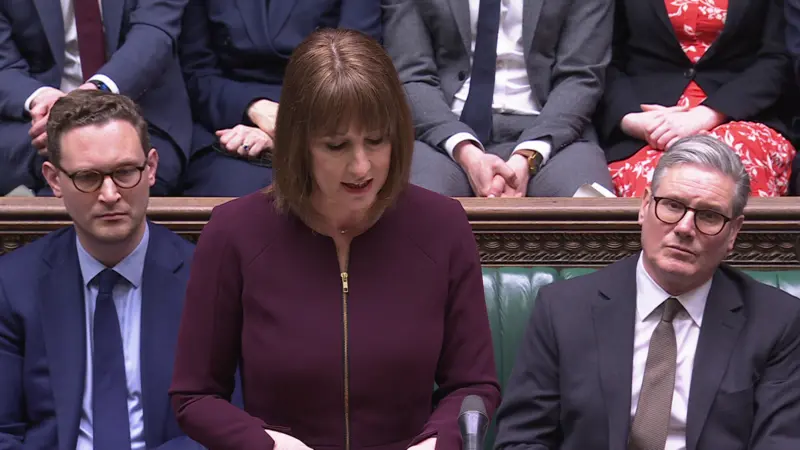Chancellor Rachel Reeves has vowed to bring inflation down to 2% by 2027, despite mounting economic uncertainty and a sharp downgrade in the UK’s growth outlook.
Delivering her Spring Statement, Reeves confirmed that the Office for Budget Responsibility (OBR) has slashed its growth forecast for 2025 from 2% to just 1%, citing turbulence in the global economy.
However, she insisted that the government remains on track to meet its fiscal rules on stability and investment, achieving them two years ahead of schedule.
Alongside the revised growth outlook, Reeves announced further tweaks to welfare reforms unveiled last week, confirming that planned cuts will trim £4.8 billion from the welfare budget.
GET INFLATION DOWN
With inflation still running above target Reeves highlighted the importance of close cooperation with the Bank of England and the role of the independent Monetary Policy Committee (MPC) in steering inflation back to 2%, down from its peak of 11% under the previous Conservative government.
“Achieving this target will provide the economy with the stable platform it needs to grow,” Reeves told MPs.
Her pledge came on the back of a surprise drop in inflation which fell to 2.8% in February from 3% the previous month, outpacing economists’ expectations.
The decline provided a boost to borrowers hoping for interest rate cuts, but Reeves remained cautious, warning that inflationary pressures could persist in the months ahead.
While the chancellor sought to strike an optimistic tone, the weaker growth forecast and ongoing fiscal tightening highlight the challenges facing the government as it attempts to balance economic stability with public spending constraints.
EASE MORTGAGE REGULATIONS

Richard Donnell, Executive Director at Zoopla, says: “The housing market needs a strong and growing economy to support housing supply.
“It’s promising to see the Government focusing on longer-term impact by boosting funding for new homes and avoiding short-term measures like stamp duty holidays that don’t really help with the fundamental challenges in the housing market.
“The top priority should be an easing of mortgage regulations, which will support first-time buyers, an important buyer group for homebuilders and the broader market.
“This would also help the rental sector, where there are still 12 people chasing every home for rent, with those on low incomes bearing the brunt. Increased funding for social housing is essential in the upcoming Spending Review to help support housing delivery and boost the stock of social rented homes, which has been static for 30 years.”
DIDN’T DO MUCH
 Jeremy Leaf, north London estate agent and a former RICS residential chairman, says: “Our first wish was granted – the Chancellor didn’t do much, if anything, to deter existing activity in the housing market.
Jeremy Leaf, north London estate agent and a former RICS residential chairman, says: “Our first wish was granted – the Chancellor didn’t do much, if anything, to deter existing activity in the housing market.
“The first way of dealing with a problem is to recognise it and the Government seems to have realised that there is a housing crisis.
“It has been widely accepted that affordable housing in particular is insufficient and improving planning is a significant contributor to that aim.
“Rachel Reeves said herself that it is too slow so the extra funding announced yesterday in the social and affordable homes programme is good news, although we still need more detail of where, when and how those spades are going to be in the ground.
“We are disappointed there wasn’t more direct assistance for the private sector.”
“We are disappointed there wasn’t more direct assistance for the private sector, particularly SMEs who cumulatively can make such a big difference to the overall problem.
“Builders won’t build unless it is profitable for them to do so and there is reasonable prospect of adequate demand for the product envisaged. It would have been good to see some recognition of this.
STAMP DUTY DEADLINE
“It also seems a little unfair on those who have moved heaven and earth to take advantage of the stamp duty concession before it disappears but who may not make it, through no fault of their own.
“The deadline could perhaps have been extended for those transactions in solicitors’ hands from the beginning of February as a small respite. Looking forward, a broader review into the impact of stamp duty on the market and making it less of a deterrent, particularly at the first-time buyer end, would have been welcome.
“We were sorry not to see anything supporting landlords to stay in the sector.”
“We were sorry not to see anything supporting landlords to stay in the sector because it is not just a question of keeping house prices in check but also rents, which have softened a little lately but are still too high.
“Overall, it’s a six out of ten. Could do better and hopefully this will improve to an eight out of ten in the next few months if these policies are seen to be making a contribution.”
EXTREMELY DISAPPOINTING

Colleen Babcock, Rightmove’s property expert, says: “It’s extremely disappointing that the government have not used the Spring Statement as an opportunity to extend the impending stamp duty deadline for those currently going through the home-moving process.
“We estimate over 70,000 buyers are going to miss the deadline and complete in April instead, and a third of those are first-time buyers.
“Given the current challenges faced by first-time buyers, our data shows that a typical first-time buyer in Britain now faces average monthly mortgage payments of £940, a 59% increase compared with £590 per month five years ago.
“Over that same period rents have increased by 40% across Great Britain. So, while we welcome the government’s focus and investment to help build more affordable homes, we’re keen to hear more about how this, or other incentives, can help more first-time buyers.”
CHALLENGING

Michael Cook, chief executive of Leaders Romans Group, says: “Given the challenge of making £15 billion worth of cuts to public spending, today’s Spring Statement was never going deliver everything on the property industry’s wishlist.
“That said, two significant pieces of good news stand out amongst some otherwise depressing statistics. And this goes to show the faith that the government has its our sector to deliver much needed growth.
“The first is the £2bn top-up for the Affordable Homes Programme which will provide up to 18,000 new social and affordable homes. With demand for rental properties outpacing supply, it’s good to see the government helping to address this need.
“However, it seems a missed opportunity that the government rarely addresses social housing in its broadest sense – homes for sale as well as for rent.
“At very little cost to the taxpayer, the government could do much more to champion shared ownership.”
“At very little cost to the taxpayer, the government could do much more to champion shared ownership as an affordable and practical way of addressing this country’s housing crisis and enable first time buyers to get a foot on the housing ladder.
“The £600m for construction training is also very welcome. But again, there is a cost-free solution to the skills shortage which has been overlooked. Again it concerns communication. The various trades and professions that make up the construction sector deserve greater respect and recognition.
“There is undoubtedly a long-overdue need for a comprehensive reassessment of stamp duty.”
“Unfortunately this may have to wait until a future spending review, but in the meantime, I would hope that the government sets about considering changes to what can be a very damaging tax – one that can cost the Treasury, rather than benefitting it, bearing in mind the unintended consequence of discouraging people to move up the property ladder.”
NO STAMP DUTY U-TURN

Matt Thompson, head of sales at Chestertons, says: “We have met a lot of first-time buyers who held out hope for the Chancellor to make a U-turn on stamp duty thresholds in today’s Spring Forecast.
“As this hasn’t been the case, first-time buyers will now have to ensure that their budget can cover the cost increase which means some might compromise on location or type of property.
“Although the rush of first-time buyers that the market has seen earlier this year has slowed down, demand remains strong as mortgage rates are still attractive enough to motivate buyers to get on the property ladder.”
“Earlier this year, the news reported an exodus of wealthy individuals from the UK amid the abolition of Non-Dom tax breaks.
“Although the Chancellor decided to soften those changes, it had already alienated a demographic that is key to the UK’s long-term economic growth.
“We are pleased that Rachel Reeves has taken the backlash into consideration and decided not to introduce a mansion tax for the time being which could see some HNWIs deciding to stay or return to the UK.”
PLANNING REFORMS A STEP FORWARD

Jonathan Handford, managing Director at national estate agent group Fine & Country, says: “The planning reforms announced in today’s Spring Statement are a significant step forward for the UK housing sector – especially for first-time buyers struggling to get onto the property ladder.
“For too long, an outdated and restrictive planning system has held back housebuilding, creating a chronic undersupply of homes, particularly in high-demand areas.
“These reforms will help to unlock land, cut red tape, and support responsible development, ensuring more high-quality homes are built where they are needed most.
“The Office for Budget Responsibility (OBR) has forecast that these changes will drive housebuilding to its highest level in over 40 years, with an extra 170,000 homes delivered by 2029 to 2030 – boosting annual supply by 30% after a decade of stagnation.
“More homes mean more options for buyers, easing affordability pressures and making homeownership a more realistic goal for many.
“The housing market is a pillar of the UK economy, and long-term stability is key.”
“The housing market is a pillar of the UK economy, and long-term stability is key.
“Alongside planning reform, the government should consider further support, such as a modernised Help to Buy scheme and targeted stamp duty reductions.
“A planning system that prioritises responsible development – combined with policies that support first-time buyers – will unlock opportunities, increase affordability, and create a stronger, more accessible property market for all.”
NOTHING NEW

John Phillips, chief executive of Spicerhaart and Just Mortgages, says: “With the backing of the latest OBR forecasts, the Chancellor lauded housebuilding figures that the OBR predicts will be at a 40-year high by the end of this parliament – with 1.3 million homes putting it in ‘touching distance of its target’. If this is achieved – and it’s a big if – this would clearly be fantastic news.
“It was good to see further funding earmarked for affordable housing, as well as additional funding for the next generation of construction workers – although both were announced in advance.
“Today’s statement really offered nothing new and once again demonstrates the clear disconnect within government between supply-side measures and tangible action and support to actually address affordability challenges faced by potential buyers in today’s housing market.
“We have long called for greater support – such as equity loan schemes or for existing schemes like Shared Ownership – to help people buy and ultimately support demand for new houses.
“The housing market plays a critical role in driving economic growth. While increasing supply is absolutely critical, we need measures now to give buyers the ability to buy – not just to enable people to achieve their homeownership goals, but to give the economy the adrenaline shot it needs.”
POTENTIAL GAME-CHANGER

Iain McKenzie, chief executive of The Guild of Property Professionals, says: “The Chancellor’s Spring Statement highlighted the potential impact of Labour’s planning reforms, with the OBR forecasting a 40-year high in housebuilding.
“If realised, this could be a game-changer for the housing market, helping to address supply shortages and improve affordability.
“However, while the government acknowledges the housing market’s significant influence on the wider economy, it remains frustrating that it is not being treated as a priority. Increased housing market activity drives consumer spending and economic growth, yet little was said about measures to stimulate transactions and support buyers.
“We need more than just planning reforms to truly unlock the potential of the property sector. Stamp duty reform, mortgage accessibility, and targeted incentives for buyers and sellers must all be on the agenda if we are to create a sustainable and thriving housing market that benefits both individuals and the economy as a whole.”
DISAPPOINTED

Richard Sexton, commercial director of surveying portal HouzeCheck, said: “I was disappointed, frankly. First, I don’t buy this idea that the spring statement exists purely to offer an update on the economic and fiscal position.
“Think back to 2019 – Philip Hammond’s spring statement was full of announcements. I felt this iteration, on the other hand, lacked ambition.
“Reeves was certainly very unwise to neglect the property market – there was nothing new in there about meeting the 1.5m homes target, however positive that would be for UK housing.
“Second, I wanted to see more investment in digital training. If AI skills were more readily available, the surveying profession could leverage tech more to improve efficiency and decision-making in residential valuation.”
UNDERWHELMING

Mark Tosetti, chief executive, Conveyancing Alliance (CAL), part of Movera, says: “After an underwhelming Spring Statement, especially concerning the property market, it now appears the sector must pull itself up by it’s bootstraps. Let’s focus on the areas we can improve internally.
“We know the government has committed to digital transformation; we too must continue to commit to this.
“We as an industry must continue to invest in people, in innovation and tech, and in other enablers that support the ambition of individual brands and ultimately builds the whole sector up with it.
“Investing in our platforms to drive efficiency, quality and turnaround times, deploy best-in-class solutions can help break down blockers across the industry.
“This was not a defining Statement for the Chancellor, but that doesn’t stop it being one for the sector.”
PLANNING REFORM STEP IN RIGHT DIRECTION

Felicity Barnett, lender operations manager, Mortgage Advice Bureau, said: “Today’s announcement that planning reforms will ensure housebuilding reaches a 40-year high, with 1.3m homes predicted to be built over the next five years, is a step in the right direction.
“Now, our industry must ensure we’re doing everything we can to, as Rachel Reeves highlighted, “come within touching distance” of the 1.5m target.
“In the context of rising rents, house prices, and the cost-of-living, demand for more affordable housing has never been greater – especially in a post Help-to-Buy world.
“Following these latest announcements, more innovation from lenders is needed. Rather than rinsing and repeating old products, we need to apply outside of the box thinking to enact real change. Focus must shift to how we can open up the contracting market, as opposed to increasing share.
“More emphasis needs to be placed on the first time buyer market.”
“More emphasis needs to be placed on the first time buyer market. As an industry, we must now work as a collective to lower the current average first time buyer age of 35+, providing those in their twenties with more accessible, affordable options to get on the property ladder.
“In particular, there needs to be a marked shift in boosting the number of renters transitioning to become first time buyers.
“These are prospective homeowners who are currently trapped by strict affordability criteria. For starters, more could be done at government level to fully realise Shared Ownership’s true potential, but this still won’t be enough on its own to achieve housebuilding targets.
“We’ll wait with bated breath to see how the FCA’s proposals to relax mortgage lending rules develop in the next few months.”
NOTHING FOR FIRST-TIME BUYERS

Mark Harris, chief executive of mortgage broker SPF Private Clients, said: “The Spring Statement was underwhelming as far as the housing market is concerned.
“The Chancellor missed an opportunity to boost all-important transactions by extending the stamp duty concession or introducing some discount for downsizers.
“She also did nothing for first-time buyers, with no incentives or assistance to get them on the housing ladder – a significant shame as first-time buyers are the lifeblood of the market and enable existing homeowners to move up the ladder.
“Housebuilding, easing planning rules and improving the supply of new homes is vital but there was very little detail as to how these targets will be delivered.”









